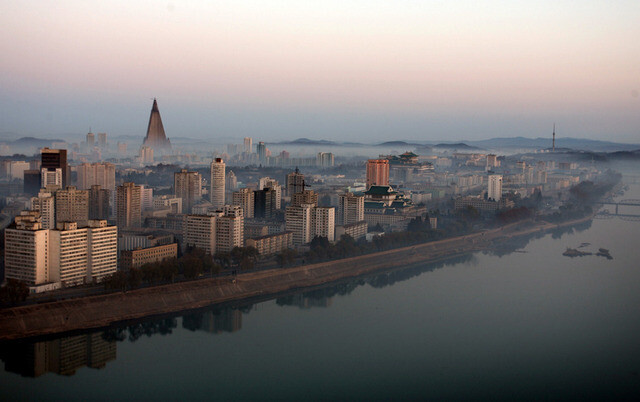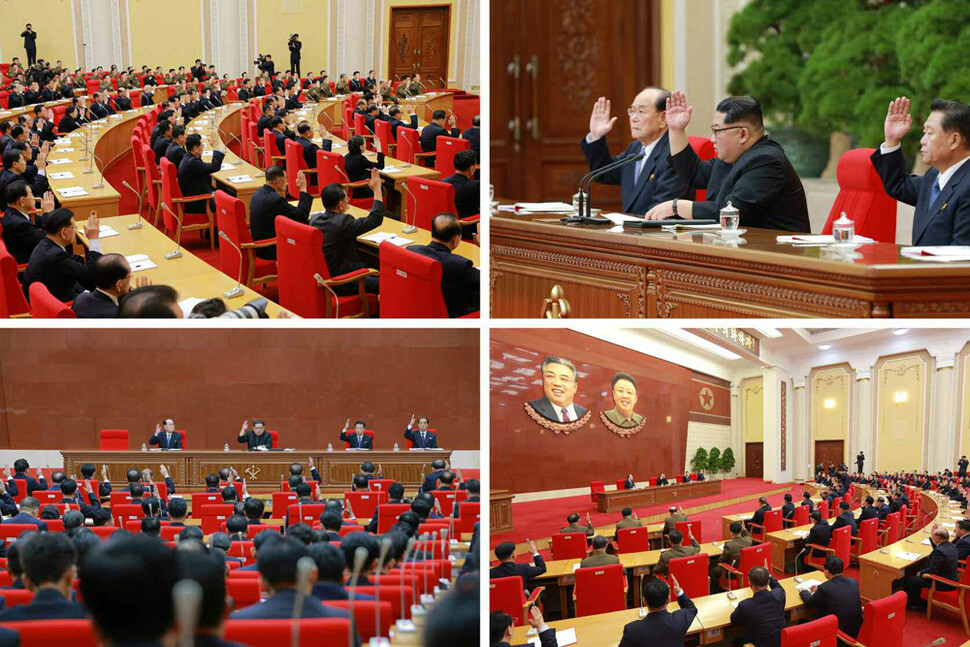hankyoreh
Links to other country sites 다른 나라 사이트 링크
[News Analysis] Economic development becomes a priority for North Korea

North Korean leader Kim Jong-un officially announced that he has changed the focus of the regime’s strategy from nuclear weapons to the economy. This important shift of strategic direction was officially announced prior to the inter-Korean and North Korea-US summits on Apr. 20, during the third plenary session of the 7th Central Committee of the Korean Workers' Party (KWP), a key leadership body in the North Korean regime.
“We have observed the brilliance of the historical achievements illuminated by our party’s strategic course on simultaneously building the economy and a nuclear arsenal. The ‘two-track’ course has concluded in a great victory,” Kim said. This marks the official end of the “two-track” development of nuclear weapons and the economy, which was adopted during a plenary session of the KWP Central Committee on Mar. 31, 2013.
Considering that the “two-track” course was the North Korean government’s strategic foundation that brought the Korean Peninsula to the brink of war last year through frequent missile test launches and six nuclear weapon tests, declaring the conclusion that this course is sure to have a major impact on circumstances on the Korean Peninsula. In addition to this, Kim said that “the party’s [new] strategic course is to focus all of its energy on building a socialist economy.” This declaration means that the crux of the state’s development strategy is shifting from nuclear weapons to the economy.
Kim’s strategic shift has become the subject of global attention because it comes prior to the inter-Korean and North Korea-US summits. This attention has focused on Kim’s declaration that “we will no longer need any nuclear tests, mid- and long-range or intercontinental ballistic missile (ICBM) test launches, and as a result the mission of the northern nuclear test site has come to an end” and on the KWP Central Committee’s subsequent decision to shut down the nuclear test site at Punggye Village and to halt nuclear tests and ICBM missile tests as of Apr. 21.
This can be seen as a preemptive measure to build trust given the suspicion that remains in various parts of the international community about Kim’s commitment to denuclearization leading up to the inter-Korean and North Korea-US summits. This is also evidence that Kim is determined to bring about successful results in those two summits.
Shortly after this was reported by the Korean Central News Agency (KCNA) on Apr. 21, US President Donald Trump said “This is very good news for North Korea and the World - big progress! Look forward to our Summit.”
The Blue House also said that it “welcomes North Korea’s decision, which represents significant progress toward the denuclearization of the Korean Peninsula and will contribute to creating a very positive environment for the success of the inter-Korean and North Korea-US summits.”

But some critics in the US and other areas point to Kim’s emphasis on the “completion of the state nuclear force” and the “conclusion of the weaponization of nuclear weapons” as the reason for the termination of the “two-track” policy and argue that this was less of a statement of genuine commitment to denuclearization and more of a declaration of the possession of nuclear weapons designed to reinforce the North’s status as a nuclear power state. To be sure, Kim did not explicitly state that he was giving up nuclear weapons. This is leading to a major divide in how experts are interpreting Kim’s decision and measures. But the majority viewpoint is that this is a significant preliminary trust-building step by the North.
On Apr. 22, Kim Yeon-cheol, professor at Inje University, said that it is necessary to remember that Kim Jong-un has repeatedly said that “denuclearization was the dying wish of our ancestors, and our unchanging stance is working to achieve denuclearization,” both when South Korea’s special delegation visited the North on Mar. 5 and when he held a summit with Chinese President Xi Jinping on Mar. 26.
“It was because North Korea has clearly stated its commitment to denuclearization that the inter-Korean summit was planned, that an agreement was reached on the North Korea-US summit and that the North Korea-China summit was held. Ultimately, North Korea’s action can be interpreted as a preemptive measure designed to build trust and create the conditions for the denuclearization negotiations,” Kim Yeon-cheol said.
“While things are still uncertain, this can be seen as Kim Jong-un crossing the Rubicon. His decision and measures mean that he will be going ‘all in’ on the economy in the future,” said a former senior official who is familiar with analyses of North Korea.
Former Unification Minister Lee Jong-seok placed particular emphasis on the fact that Kim had unilaterally decided to shut down the Punggye Village nuclear test site. For one thing, there is no precedent of a nuclear power state shutting down a nuclear test site and declaring it will not carry out any more nuclear tests. On top of that, shutting down the Punggye Village site was a major concession that Kim could have offered Trump during their summit. This shows how committed Kim is to bringing the inter-Korean and North Korea-US summits to a successful conclusion.
“The devil is in the details”“It generally takes more than 15 test launches to secure the accuracy and safety of ICBMs. By declaring that it’s halting test launches before reaching that point, the North is making a friendly overture to the US, which has regarded those tests as a grave security threat. This is a rather encouraging buildup to the two summits,” said another veteran expert, who wished to remain anonymous.
“We mustn’t forget that the devil is in the details. Since it’s not clear whether North Korea’s declaration of the end of the ‘two-track’ course is based on shutting down its nuclear program or on the completion of its nuclear program, the crucial question is how to convince the North to shut down that program during the inter-Korean and the North Korea-US summit,” this expert added.
Considering that Kim Jong-un has steadily pushed for the “marketization” of the North Korean economy since he took power in 2012, attention should also be paid to the section of the plenary session’s decision statement that promises to “push for dialogue and closer ties with our neighbors and the international community.”
The same can be said for the explicit declaration of the two goals of “creating an international environment that is well-suited for the construction of a socialist economy” and “defending the peace and stability of the Korean Peninsula and the world.” During the upcoming inter-Korean and North Korea-US summits, there will be agreements of various importance between South Korea, North Korea and the US in regard to denuclearizing the Korean Peninsula, establishing a permanent peace regime, resolving military hostility and guaranteeing the security of the North Korean regime.
The process of implementing those agreements is likely to coincide with the relaxing of sanctions against the North by the UN and other parts of the international community and the expansion of North Korea’s access to the international economic system. Furthermore, Kim’s decision and measures largely suggest that he hopes to use the two summits to ease the international community’s concerns in exchange for resolving military hostility to guarantee the security of the North Korean regime and unlocking the door to becoming a member of the international economic system.
By Lee Je-hun, senior staff writer
Please direct questions or comments to [english@hani.co.kr]

Editorial・opinion
![[Column] Has Korea, too, crossed the Rubicon on China? [Column] Has Korea, too, crossed the Rubicon on China?](https://flexible.img.hani.co.kr/flexible/normal/500/300/imgdb/original/2024/0419/9317135153409185.jpg) [Column] Has Korea, too, crossed the Rubicon on China?
[Column] Has Korea, too, crossed the Rubicon on China?![[Correspondent’s column] In Japan’s alliance with US, echoes of its past alliances with UK [Correspondent’s column] In Japan’s alliance with US, echoes of its past alliances with UK](https://flexible.img.hani.co.kr/flexible/normal/500/300/imgdb/original/2024/0419/2317135166563519.jpg) [Correspondent’s column] In Japan’s alliance with US, echoes of its past alliances with UK
[Correspondent’s column] In Japan’s alliance with US, echoes of its past alliances with UK- [Editorial] Does Yoon think the Korean public is wrong?
- [Editorial] As it bolsters its alliance with US, Japan must be accountable for past
- [Guest essay] Amending the Constitution is Yoon’s key to leaving office in public’s good graces
- [Editorial] 10 years on, lessons of Sewol tragedy must never be forgotten
- [Column] A death blow to Korea’s prosecutor politics
- [Correspondent’s column] The US and the end of Japanese pacifism
- [Guest essay] How Korea turned its trainee doctors into monsters
- [Guest essay] As someone who helped forge Seoul-Moscow ties, their status today troubles me
Most viewed articles
- 1[Column] The clock is ticking for Korea’s first lady
- 2Hong Se-hwa, voice for tolerance whose memoir of exile touched a chord, dies at 76
- 3After 2 months of delayed, denied medical care, Koreans worry worst may be yet to come
- 4[Column] Has Korea, too, crossed the Rubicon on China?
- 5US overtakes China as Korea’s top export market, prompting trade sanction jitters
- 6Samsung barricades office as unionized workers strike for better conditions
- 7All eyes on Xiaomi after it pulls off EV that Apple couldn’t
- 8[Correspondent’s column] In Japan’s alliance with US, echoes of its past alliances with UK
- 975% of younger S. Koreans want to leave country
- 10[Correspondent’s column] The US and the end of Japanese pacifism